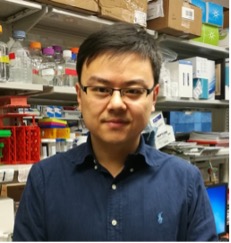
Northwestern Medicine scientists have uncovered a key pathway controlling tumor growth in B-cell lymphomas, according to a study published in the Journal of Clinical Investigation.
B-cell lymphoma, a type of cancer that starts in white blood cells called lymphocytes, accounts for 85 percent of non-Hodgkin lymphoma diagnoses in the U.S. each year.
Many subtypes of B-cell lymphomas are thought to be impacted by an imbalance between Polycomb Repressive complexes (PRC1/PRC2) and the PR-DUB complex, but exactly how these epigenetic proteins impact cancer development has remained unclear.
“Some scientists believe that BAP1, the enzymatic subunit within the PR-DUB complex, is a tumor suppressor because loss of BAP1 were observed in some specific tumor types,” said Lu Wang, PhD, assistant professor of Biochemistry and Molecular Genetics, who was senior author of the study. “But others believe that BAP1 functions as an oncogene, because if you inhibit BAP1 activity or genetically deplete of BAP1 in a BAP1-expressing tumor, the cells also die. This is a major debate in this field: whether BAP1 functions as a tumor suppressor or oncogene, and how it functions in a tumor context-dependent manner.”
In the current study, investigators analyzed multiple cultured human cancer cell lines with BAP1 and compared them to cell lines that had BAP1 inhibited. Through RNA sequencing, they found that BAP1 increased the expression of several MHC-II genes, which are known to play a critical role in the body’s immune responses.
Next, scientists focused on B-cell lymphoma, which express high levels of functional MHC-II molecules. They found depletion of the BAP1 gene in B-cell lymphoma cells reduced the immune cell infiltration and accelerated tumor growth in animal models.
Finally, investigators inhibited polycomb repressive complex 1 (PRC1), which works to antagonize BAP1 activity, and found that it restored MHC-II expression in BAP1-deficient lymphoma cells.
“BAP1 and PRC1 form a balance,” said Wang, who is also a member of the Robert H. Lurie Comprehensive Cancer Center of Northwestern University. “These two enzymes control the proper expression levels of MHC-II molecule. In a tumor, if you lose BAP1, you lose that balance. In this case, in BAP1 depleted tumor cells, you can rebalance the transcription by inhibiting the antagonist, PRC1.”
Taken together, the findings may prove useful in improving immunotherapies for B-cell lymphomas, Wang said. His laboratory is now working to develop effective PRC1 inhibitors in hopes of improving current immunotherapies for B-cell lymphomas.
“We want to improve the compound in order to rescue MSC-II expression and reestablish the tumor microenvironment in animal models,” Wang said.
The study was supported by National Institutes of Health grant R35GM146979 and partially by Research Scholar Grant RSG-22-039-01-DMC from the American Cancer Society, and Idea development award (HT94252310360) from U.S. Department of Defense.






